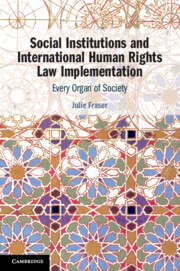Book contents
- Social Institutions and International Human Rights Law Implementation
- Social Institutions and International Human Rights Law Implementation
- Copyright page
- Dedication
- Contents
- Foreword
- Acknowledgements
- 1 Introduction: The Challenge of Human Rights Implementation
- 2 Human Rights and Their Cultural Connection
- 3 Domestic Implementation of International Human Rights Treaties: Legislative and Other Effective Measures
- 4 Domestic Implementation of International Human Rights Treaties: The Role of Public and Private Actors
- 5 Role of Islamic Law and Institutions in Implementing Women’s Right to Family Planning in Indonesia
- 6 Conclusions: Social Institutions and the Future of Domestic Human Rights Implementation
- Select Bibliography
- Index
2 - Human Rights and Their Cultural Connection
Published online by Cambridge University Press: 04 September 2020
- Social Institutions and International Human Rights Law Implementation
- Social Institutions and International Human Rights Law Implementation
- Copyright page
- Dedication
- Contents
- Foreword
- Acknowledgements
- 1 Introduction: The Challenge of Human Rights Implementation
- 2 Human Rights and Their Cultural Connection
- 3 Domestic Implementation of International Human Rights Treaties: Legislative and Other Effective Measures
- 4 Domestic Implementation of International Human Rights Treaties: The Role of Public and Private Actors
- 5 Role of Islamic Law and Institutions in Implementing Women’s Right to Family Planning in Indonesia
- 6 Conclusions: Social Institutions and the Future of Domestic Human Rights Implementation
- Select Bibliography
- Index
Summary
Due to persistent cultural contestation of rights, Chapter 2 elaborates upon the history and relationship between culture and human rights. It sketches the development of international human rights law from the 1940s to date, detailing the debates in that period regarding universality and cultural relativism. The chapter concludes that the debate is less dichotomous now, forging a middle path that acknowledges (to an extent) the importance of culture and its (not unlimited) accommodation in human rights. One mechanism by which human rights can accommodate cultural diversity is via domestic implementation. Therefore, Chapter 2 includes a detailed analysis of literature on culturally sensitive approaches to human rights implementation, which advocate embedding rights in local social institutions to secure their acceptance, protection and enjoyment. Chapter 2 argues that such approaches are crucial as they demonstrate principled respect for cultural diversity, as well as promoting the efficacy of implementation measures.
Keywords
- Type
- Chapter
- Information
- Social Institutions and International Human Rights Law ImplementationEvery Organ of Society, pp. 21 - 63Publisher: Cambridge University PressPrint publication year: 2020

